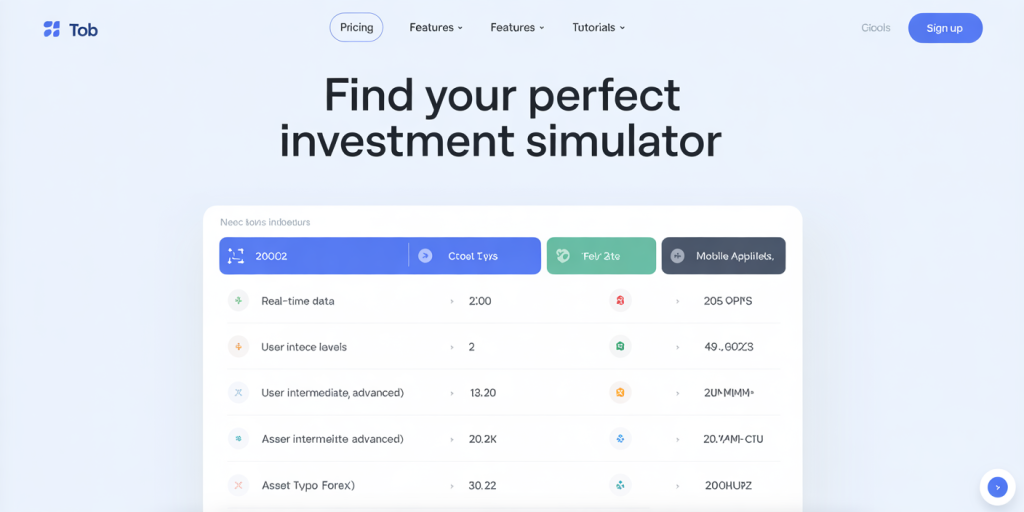Where to Find Investment Simulators to Practice Without Risk
Learning how to invest effectively is a crucial skill in today’s financial landscape. However, the fear of losing money often prevents many beginners and even seasoned investors from experimenting with new strategies. Investment simulators have emerged as powerful tools that allow individuals to practice trading without risking their actual capital. These platforms recreate real market conditions through virtual portfolios, giving users hands-on experience while mitigating financial risks.
The global rise in retail investing, catalyzed by technology and accessibility, has made investment simulators more relevant than ever. According to a 2023 report by Statista, over 55 million retail investors in the United States alone actively use financial apps, many starting with simulated environments. Simulators not only help users understand market dynamics but also refine their decision-making skills before deploying real capital.
Why Use Investment Simulators?
Investment simulators provide risk-free environments to experiment with stocks, bonds, ETFs, and other securities. For beginners, they serve an educational purpose—teaching fundamental concepts like portfolio diversification, market orders, and stop-loss strategies. For experienced investors, simulators function as testing grounds for new strategies, asset classes, or automated trading bots without the fear of actual loss.
Practical experience is invaluable in financial markets where emotions—fear and greed—often drive irrational decisions. By using simulators, traders can keep emotions at bay by focusing purely on strategic execution and data analysis. This approach significantly improves the chances of success in real investing scenarios. Numerous success stories from platforms like Investopedia’s Simulator reveal how users transitioned from virtual trading to profitable real accounts.
Top Platforms Offering Investment Simulators
Selecting the right simulator depends on your investment knowledge, goals, and the types of securities you want to trade. Below is a comparative table highlighting some of the most popular investment simulators in 2024:
| Platform | Asset Variety | User Interface | Realism of Market Data | Mobile App | Cost | Ideal for |
|---|---|---|---|---|---|---|
| Investopedia Simulator | Stocks, ETFs | Beginner-friendly | Slight Delay | Yes | Free | Beginners and Educators |
| Thinkorswim (TD Ameritrade) | Stocks, Options, Futures | Advanced | Real-Time | Yes | Free with account | Active Traders |
| MarketWatch Virtual Stock Exchange | Stocks, ETFs | Intermediate | Slight Delay | No | Free | Intermediate Investors |
| Wall Street Survivor | Stocks, ETFs | Beginner | Slight Delay | Yes | Free + Premium | Gamified learning |
| Forex Tester | Forex Currency Pairs | Advanced | Historical Data Replays | Yes | Paid | Forex Traders |
| eToro Practice Account | Stocks, Crypto, ETFs | User-friendly | Real-Time | Yes | Free | Social Trading Investors |
Investopedia Simulator


Investopedia’s Simulator is an excellent starting point for beginners desiring a comprehensive introduction to stock and ETF trading without overwhelming complexities. The platform offers a virtual balance of $100,000, allowing users to build diversified portfolios. It features news feeds and tutorials, complementing the practical exercises with relevant market insights.
A notable success case is Sarah L., who after six months of trading with Investopedia’s Simulator, reported a 20% virtual portfolio increase. This confidence propelled her into opening a live investment account, where she applied strategies developed during simulation.
Thinkorswim by TD Ameritrade
Considered one of the most powerful simulators, Thinkorswim targets advanced traders focused on options, futures, and equities alike. It uses real-time market data, making it highly accurate for day-trading simulations. Users can test complex strategies in simulated environments without any monetary commitment.
According to TD Ameritrade’s internal research, about 30% of active traders on Thinkorswim report gaining the confidence to increase their real trading volumes after simulation periods ranging from 3 to 12 months.
Specialized Simulators for Niche Markets
While stock market simulators dominate the landscape, other specialized simulators cater to niche investing areas.
Forex Tester for Currency Traders
Foreign exchange markets present unique complexities, including high volatility and leverage risks. Forex Tester is a paid tool offering advanced features such as historical data replay, enabling users to backtest strategies over past market conditions. This simulator is invaluable for forex traders who want to validate systems over thousands of pips before risking real funds.
Research from the Forex Traders Association shows that traders using simulation tools like Forex Tester have a 25% higher likelihood of profitable live trading within their first year.
Crypto Simulators
Cryptocurrency investing attracts a large pool of retail investors, yet its 24/7 market and volatility demand unique simulation approaches. Platforms like eToro’s Practice Account provide mock crypto trading, mimicking live prices accurately. Through social trading features, new users can observe experts’ trading habits in real time.
For example, the crypto community forums document several users transitioning from simulated eToro accounts to real crypto wallets, reporting improved risk management due to their prior practice.
Benefits of Using Investment Simulators
Investment simulators offer multiple benefits beyond mere price tracking. They enhance decision-making by allowing users to analyze portfolio performance with various metrics such as ROI, volatility, and sector exposure.
Additionally, simulators allow experimentation with advanced order types such as limit orders, stop-losses, and trailing stops. These functions are often overlooked by novices but are critical for minimizing risk in live trading.
Moreover, simulators lower the psychological barriers of trading. By removing financial repercussions, users focus on developing disciplined habits, which translate to better long-term investing results. Data from a 2022 behavioral finance study demonstrated that 65% of simulator users developed more rational investing habits after simulated trading.
Practical Tips to Maximize Simulator Use
To get the most out of investment simulators, treat your virtual portfolio as if it were real money. Set realistic goals and avoid reckless trades that wouldn’t apply in actual scenarios. Document your trades and review them frequently to identify strengths and weaknesses.
For instance, consider maintaining a trading journal integrated with your simulator use, noting reasons behind each trade, intended outcomes, and post-trade reflections. This practice aligns with techniques employed by professional traders and hedge fund managers.
Combining simulated trading with continuous education—webinars, financial news, and analysis—further enhances learning outcomes. Real-world case studies, such as the rise and fall of speculative bubbles, often taught on simulators, offer critical insights into market psychology.
Future Perspectives of Investment Simulators
As technology evolves, investment simulators are expected to become even more immersive and integrated with artificial intelligence (AI). AI-driven simulators will offer personalized coaching by analyzing individual trading patterns and recommending tailored strategies.

Virtual reality (VR) investment simulators may also gain traction, providing users with visual and interactive representations of markets and portfolio performance. This immersive experience could deepen understanding and enhance retention for learners.
Furthermore, increased regulation and transparency measures may encourage financial institutions to embed simulator features directly within their trading platforms. This would lower entry barriers for new investors and promote financial literacy universally.
Industry experts predict that by 2030, at least 70% of retail investors globally will have used some form of simulated trading before investing real capital. This trend underscores the growing recognition of simulators as an essential component of investor education and risk management.
—
Investment simulators represent a critical resource for anyone interested in exploring financial markets without jeopardizing their hard-earned money. Whether you are a novice wanting to learn the basics or an experienced trader experimenting with complex strategies, numerous platforms cater to your needs—from beginner-friendly interfaces to intricate real-time simulation environments.
By leveraging these tools responsibly and combining them with continuous learning, investors can build confidence, sharpen skills, and ultimately improve their chances of long-term success. The future portends even smarter, more immersive simulators, transforming how investors prepare for the challenges and opportunities of global financial markets.
